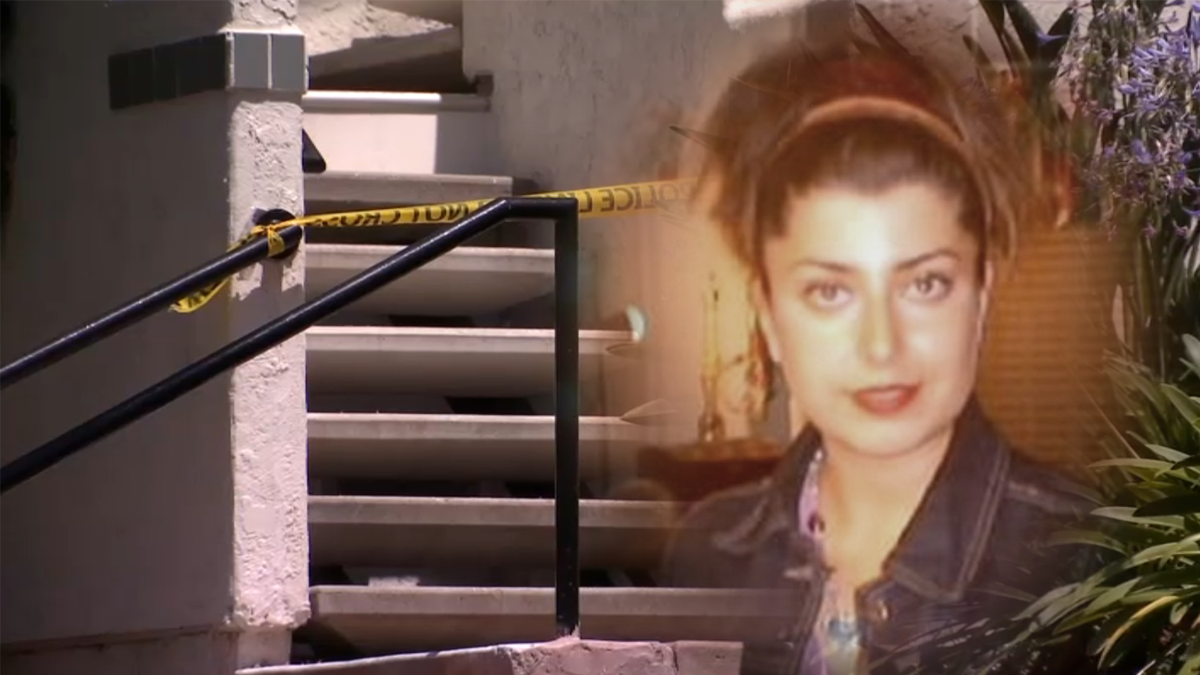A central argument in the Rancho Peñasquitos murder trial has been what killed Connie Dadkhah. The prosecution says Parrish Chambers Jr. beat her to death after breaking into her condo. He’s pleaded not guilty. They’ve called on multiple experts, including a San Diego County deputy medical examiner, who testified Dadkhah suffered multiple skull fractures, which caused brain bleeds. Graphic photos of the autopsy were shown to jurors, which appeared to show several cracks in her skull.
The defense has a different story: a drug overdose. During opening statements earlier in the week, public defender Abe Genser told jurors that Chambers and Dadkhah reconciled after the attack, had sex and then did drugs, specifically methamphetamine. He says the pair had an abusive and toxic romantic relationship.
The two narratives came to a head Thursday when proceedings delved into the toxicology reports of Dadkhah's blood. Phyllis Mallet with the San Diego County Medical Examiner's Office testified that blood samples from Dadkhah showed a very high level of meth in her system.
“When you tested Ms. Dadkhah’s levels it was off the charts?” Genser asked.
“It was higher than our highest calibrator. Yes,” Mallet responded.
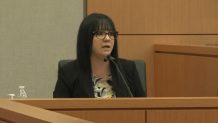
But then, the proceedings were abruptly halted during testimony from Kristen Steward, a forensic toxicologist with Bio-Tox Laboratories in Riverside. She referenced a medical study article that determined methamphetamine levels appear to increase in the body after death.
“There can be changes that occur after death, where the concentration can be higher than it was prior to death,” Steward testified. “For instance, drugs can move outside of the fat or can pool in the heart area and cause higher concentrations of drugs that would not have been as high prior to death.”
Upon hearing the testimony, Genser called for a sidebar, which resulted in the jury being removed from the courtroom. Genser then leveled a series of accusations at deputy district attorney Trisha Amador.
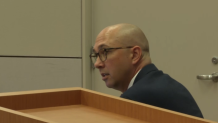
Genser argued there had been a violation of the rules of discovery, which mandates that attorneys on both sides of a case are given full access to all the case evidence before trial. He says he was never made aware of the study that Steward referenced and said Amador took witness statements and material from Steward and didn’t disclose them. Because of that, he accused Amador of violating Chambers’ right to due process.
Deputy district attorney Martin Doyle, working alongside Amador, disagreed with the accusations. He says the prosecution isn’t obligated to report everything witnesses say to attorneys prior to trial or turn over anything witnesses rely upon, including their past experience.
The judge then called for a special hearing, outside the presence of the jury, where the evidence could be discussed and the accusations reviewed.
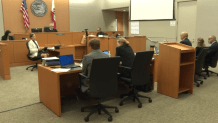
During that hearing, Genser questioned Steward about her conversation with Amador and how the study article was provided to the prosecution. Doyle objected, citing attorney work privilege. Genser responded by saying that privilege goes away when misconduct occurs.
“No, that is just absolutely wrong,” Doyle responded. “What counsel is referring to is when a defendant, who is the holder of attorney-client privilege alleges that his attorney render ineffective service or in some way challenges the representation, the client has waived that privilege.”
Judge Peter Deddeh agreed, sustaining the objection.
Against Gensers repeated protests, Judge Deddah ultimately ruled there was no discovery violation. He then allowed Genser to provide the study article to his own toxicology experts and recall Steward back to the stand for more questioning at a later time.
More evidence introduced
Earlier in the day, the prosecution called two other witnesses to the stand who revealed other evidence that was collected in the case. A now-retired San Diego County District Attorney’s Office investigator revealed how police seized and cracked into Dadkhah's and Chambers’ mobile phones. She said text messages and videos revealed a lot about their relationship but still left a lot of questions unanswered.
“Their relationship was complicated, so it was difficult to say exactly what it was, but I can’t rule out a romantic relationship,” Tina Scott testified.
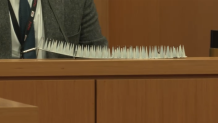
In one instance, the physical evidence was actually shown to the jury. That was a strip of "bird spikes" that was installed on Dadkhah's second-story balcony. Those devices are typically used to prevent birds from landing in areas and making a mess. In this case, prosecutors say a downstairs neighbor installed it for Dadkhah to try to prevent Chambers from climbing onto that balcony.
The fact that Chambers climbed that balcony and smashed through Dadkhah's sliding glass door is not being disputed by the defense.
Testimony given on the false imprisonment charge

In addition to the murder charge, prosecutors also charged Chambers with three other crimes where they say Dadkhah was his victim. That includes two counts of battery and one count of false imprisonment. He’s pleaded not guilty to all the charges.
One of the final witnesses of the day testified about the false imprisonment incident. In November of 2021, prosecutors say Chambers forced Dadkhah into a vehicle at a parking lot very early in the morning.
“Then all of sudden, he reached out and grabbed her by the hair and drug her back to the car," Michael McCarthy said. “Then he opened up the passenger door of the car and pushed her, pushed her, pushed her in.”
Prosecutors say Dadkhah called 911 before that attack and was still on the line when it happened. The call was played for the court, and Dadkhah could be heard screaming and pleading for him to stop, while a deep man’s voice is heard yelling profanities.
Click here to read up on what happened during the other days of the murder trial. You can also watch replays of each day's proceedings the weekday after they happen, starting at 11:30 a.m.
Background on the murder case
On the morning of June 15, 2022, prosecutors say Parrish Chambers emerged from Dadkhah's condo, spattered with her blood. They say he flagged down a neighbor to call 911 to report that she was dead inside. He was taken into custody soon after and charged with her murder.
But it’s what happened the night before that has her family, friends and neighbors questioning whether her death could have been prevented.
Police dispatch records show around 7 p.m. on June 14, 2022, Dadkhah's neighbors began calling 911. They begged police to get there quickly, reporting that a belligerent man was trying to break into a woman’s condo. Initially, the call wasn’t prioritized. About an hour later, callers had new information to tell dispatchers: the man had scaled a wall to her second-floor balcony and smashed his way inside through a sliding glass door. While police upgraded the call to a higher priority, it took another 45 minutes for officers to arrive at the complex.
Those same dispatch records, along with court filings from prosecutors, reveal what happened next. Officers tried to make contact with Dadkhah by calling her phone, knocking on her door and using a loudspeaker. But officers left the scene 15 minutes later after failing to make contact with anyone inside. There’s no record of Dadkhah calling police that night.
In defending their decision not to force entry the night before, police told NBC 7 Investigates they had reason to believe that Chambers lived there. That was based on a dispatch record accessed by responding officers. Police also told NBC 7 the decision to force entry into anyone’s home shouldn’t be taken lightly and is among the highest level of legal standards they operate under.
But Chambers didn’t live there, though NBC 7's investigation revealed a lengthy history between the two. Court filings show that included an incident in 2020 where Chambers was convicted of vandalism. The judge ordered Chambers to stay away from Dadkhah.


